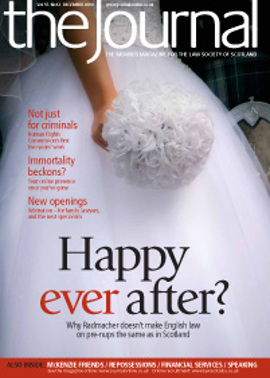Problems of definition

Fundamental nullity
It is difficult to identify just what kind of procedural infelicity (to use a broad neutral term) is so infelicitous as to render criminal proceedings fundamentally null. The power to amend an indictment or complaint is very wide and courts have been increasingly unwilling to let cases founder for technical reasons.
Parliament too has endorsed a move away from arguments about form by enacting what is now s 300A of the Criminal Procedure (Scotland) Act 1995, a section headed “Power to excuse irregularities”. This power (akin to the “dispensing power” in civil cases) is drawn very widely and appears to allow almost any procedural error to be rectified, subject only to limited conditions.
Although it is thought that there have been a number of cases in which s 300A has been used since its enactment, the first to appear on the SCS website is Shahid v PF Kilmarnock [2010] HCJAC 100 (8 October 2010).
The problem here was that the fiscal had omitted to sign the principal complaint, something not spotted until after the accused had pleaded guilty to one of the two charges libelled. The sheriff excused the irregularity under s 300A, but his decision was suspended by the appeal court, which held that failure to sign the complaint was not a procedural irregularity in terms of s 300A(1). That subsection permits the use of the power only where the irregularity has occurred in relation to “proceedings before the court”. Since there was no signed complaint, there were no “proceedings” in terms of s 138(1) of the Act. The complaint was thus incompetent and should have been dismissed.
Attempting to pervert the course of justice
About 2,000 charges of attempting to pervert the course of justice are proferred annually in Scotland, despite the uncertain provenance of this crime. But HM Advocate v Harris [2010] HCJAC 102 (8 October 2010) may be briefly noted, being a recent attempt to challenge the current orthodoxy. Three charges libelling this crime were in issue; two of them related to alleged threats and intimidation of police officers carrying out investigations, while the third alleged a series of events which, if proved, were designed falsely to incriminate the victim in an offence of speeding. These charges had been held irrelevant by the sheriff, but that decision was reversed on appeal on the basis that the crime (which could take many forms) was well established at common law and that there was no contravention of article 7 of the Human Rights Convention in what had been libelled.
Want of due citation?
Yet another appeal case has been sent to a larger bench, this time a matter originating in the JP court at Stonehaven. The accused in Chilcot v McGowan [2010] HCJAC 106 (22 October 2010) was charged with speeding. His plea to the competency of the proceedings was rejected by the justice. But in the appeal court, a bench of three judges declined to resolve an apparent inconsistency in the case law concerning the effect of s 144(8) of the 1995 Act, which renders it incompetent for anyone appearing to answer a complaint to plead want of due citation or informality therein or in the execution thereof.
The problem had arisen because the complaint had never been served, although after sundry procedure (complicated by the service of another complaint) the accused’s agent received a copy. He submitted a letter plea of not guilty, resulting in the fixing of intermediate and trial diets.
At the trial diet, the plea of not guilty was allowed to be withdrawn and the competency of the proceedings was later debated; the justice held, on the basis of Scott v Annan 1981 SCCR 172, that any lack of service had been cured by the earlier tendering of the plea of not guilty. But the trouble was that in Beattie v McKinnon 1977 JC 64, it had been held that the predecessor to s 144(8) was not applicable where there was no citation at all, and that case was not referred to in Scott v Annan. Since later authority had not resolved the conflict between these two cases, the matter was remitted to a larger court.
Public indecency
Since the discovery (or rediscovery) of the crime of public indecency in Webster v Dominick 2005 JC 65, problems of definition have not disappeared. The latest case to bring these into sharp focus is DF v Procurator Fiscal, Dundee [2010] HCJAC 108 (28 October 2010), where the High Court quashed a conviction on the basis that the activity complained of (a performance of oral sex watched only by two police officers) was not done in public. It was, however, done in the open air in a cemetery at about 8.30pm and the sheriff had found in fact that this was a place to which the public generally had unrestricted access. But the problem for the Crown was that there were no findings relevant to the likelihood of the conduct being discovered by a member of the public, or as to the attitude of the appellant to the risk of such discovery.
The appeal court stressed that whether an indecent act was “public” depended on the whole circumstances in which it occurred, no matter whether the locus was a public place or a private one on which conduct was easily visible to members of the public. Proof of actual knowledge on the part of the accused that someone else was witnessing the crime was unnecessary, and the mens rea for the crime could be inferred from the fact that such observation had occurred, where the likelihood was that persons would observe what was being done and where the accused was recklessly indifferent to whether or not he was observed. On the findings in the instant case, no such inference could be drawn.
Mandatory sentence for firearms offence
Section 51A of the Firearms Act 1968 continues to cause difficulties for sentencers. It provides for a minimum of five years for a range of offences under the Act, including possession of a firearm without a firearms certificate and possession of a prohibited weapon, unless the court is of the opinion that there are exceptional circumstances relating to the offence or the offender which justify its not imposing such a sentence.
In Cochrane v HM Advocate [2010] HCJAC 117 (18 November 2010) the firearm in question was a 7.5mm Browning self-loading pistol which was found under the mattress of the accused’s bed. She pleaded guilty to the above possession offences; after conducting a proof in mitigation, the judge could find no exceptional circumstances and imposed concurrent five year terms. An appeal against these sentences first came before two judges who were unable to agree; they sent the case for a rehearing before three judges. They also failed to agree; by a majority the appeal was allowed and a sentence of 240 hours’ community service imposed.
In his opinion, Lord Reed (with whom Lord Marnoch agreed) reviewed the authorities, including R v Rehman and Wood [2006] 1 Cr App R (S) 77 and HM Advocate v McGovern 2007 SCCR 173, and concluded that circumstances are “exceptional” if it would mean that to impose five years’ imprisonment would result in an arbitrary and disproportionate sentence, having regard to the circumstances of the case as a whole, and that the sentencing judge had erred in her assessment.
Having listed a large number of mitigating factors relevant to the issue of “exceptional circumstances”, he identified two significant and unusual features: first, the pistol was a wartime souvenir which had been in the possession of the appellant’s father since the Second World War and had been found by the appellant among his effects, and secondly, the court had to proceed on the basis that the appellant did not know that her possession of the pistol was unlawful.
When account was also taken of her personal circumstances, the mandatory sentence was not justified, being outside the range for cases which Parliament must have had in mind as the norm.
But with these conclusions Lord Carloway disagreed, citing the sentencing judge’s findings in fact. From these it was plain (among other things) that she did not accept that the appellant had kept the gun as a memento, or that it did not occur to the appellant that she needed a licence for it. The appellant had never said that she was unaware that her possession was unlawful and her actions in concealing the weapon and not declaring its existence pointed towards her awareness of its illegality.
Among other factors, the appellant had deliberately kept the pistol; she had a significant conviction for violence and her son, who also had a background of violence, was aware of the existence of the gun. Even if the circumstances were exceptional, a non-custodial sentence could not be justified for the possession.
Cadder: a postscript
So much publicity and discussion has attached to the decision of the Supreme Court in Cadder v HM Advocate [2010] UKSC 43 (26 October 2010), and its sequel the Criminal Procedure (Legal Assistance, Detention and Appeals) (Scotland) Act 2010, that further comment here is restricted to two key matters. First, the attitude of the Scottish Criminal Cases Review Commission to old cases will be absolutely crucial, having regard to the new s 194C(2) of the 1995 Act which requires the Commission to have regard to the need for finality and certainty in the determination of criminal proceedings; and secondly, when (if at all) and how will the High Court use its power under the new s 194DA to reject a reference by the Commission as not in the interests of justice?
Charles Stoddart is a criminal law author and a former sheriff
In this issue
- Guidance on evidential requirements for salmon fishing titles
- The problem of drug misuse: the Portuguese alternative
- Winter wondering
- Targeting best value
- Wedded to the pact?
- Human = people
- Fee changes in New Year
- Choosing friends
- Digital death
- Evolution or revolution?
- Agreeing to disagree
- Commercial sense
- Justice: the election target
- Law reform update
- Roadshows bring in hundreds
- Save our system
- Gill moves a step closer
- Member benefits grow
- Ask Ash
- Social media - Trojan horse?
- Speaking legally
- Setting your priorities
- Problems of definition
- A fishy business
- Creating a jigsaw
- One size fits all?
- Scottish Solicitors' Discipline Tribunal
- Website review
- Book reviews
- Climate change, culture change
- Default position
- Contaminated land guidance revised
- New and improved






